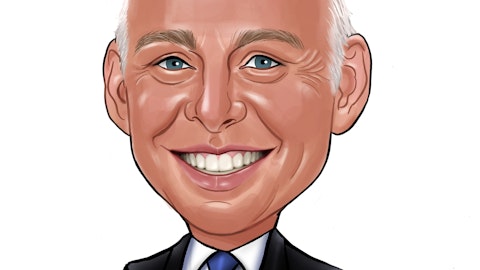Craig Siegenthaler: Thank you, Marty. And maybe just a follow-up on the other question on real estate, maybe asking a different way. So we have really great I think visibility into your liquid public funds and also INREIT’s investment performance. But maybe could you talk about how some of the performance in the other products, the private products trended in 2022? I’m especially looking for core real estate debt and also the opportunistic drawdowns?
Marty Flanagan: Look, I don’t have a specific performance in front of me, so hard to answer the question. What I will say it’s a strong €“ a very, very strong team. The core capability is, it’s just a fundamental strength to the organization and the client relationship has been very, very strong over an exceeding long period of time. So again, I’m sorry, I don’t have the specific performance that you’re asking about.
Craig Siegenthaler: No worries. Guys, thanks for taking my questions. Thank you, Marty.
Marty Flanagan: Appreciate it.
Operator: And now, Alex Blostein with Goldman Sachs.
Alex Blostein: Hey Marty and Allison. Quick, maybe just a quick follow-up to Craig’s question around fixed income. I was hoping you guys could give some details around Invesco’s position with some of the specific products that you feel most kind of optimistic about if the recent recovery and fixed income flows from the industry continues. And how are you thinking about your ETF positioning in fixed income versus the active book in fixed income?
Marty Flanagan: I’ll make a couple comments. Just with our €“ within the ETF franchise, fixed income continues to be an opportunity for us, right? The strength has come historically from equities. We surely think we have the capabilities to grow off the ETF franchise and fixed income. So we would look at going into the year. With regard to fixed income in particular, the suite of capabilities of performance is really quite strong. So it’s really going to be driven by what we see in our client demands. There’s been the munis, in the retail channels in the United States, muni bonds is a very attractive all the short duration elements. Bank loans continue to be very strong. So again, it depends on the market and where we are. But Allison, do you have any further insights from your perspective?
Allison Dukes: No, I mean, I think, whenever it is that inflation at least €“ well, inflation declines and you start to see some pausing with the Fed and rate movements, I think we expect total returns to be strong overall. We would expect that to be sometime in 2023. I think Marty hit on the areas of real strength. Munis, certainly, we see that as our customers continue to focus on taxes as being an area that we expect to hear even more bullish sentiment over the course of this year. Our global liquidity is held up very nicely and we expect demand to continue there. Fixed income SMAs that’s been a very strong area for us that continues to be a wrapper that’s in real demand. Stable value has been a leading capability for us for a very long time.
So, I think, it really does depend on your perspective on rates and credit of course. But we do expect there to be an inflection point and continued demand across a lot of our capabilities this year. I think overall net flows are still favoring ETFs over some of our active strategies, but we feel well positioned in both.
Alex Blostein: Got it. Thanks for that. And then, Marty, you mentioned strong balance sheet and I think the commentary you’ve made around it is sort of enabling you to operate strategically. Could you expand a little bit on that? Does that just mean sort of build liquidity and then eventually resume more active capital return program? Or do you think this environment opens up incremental M&A opportunities for Invesco?



